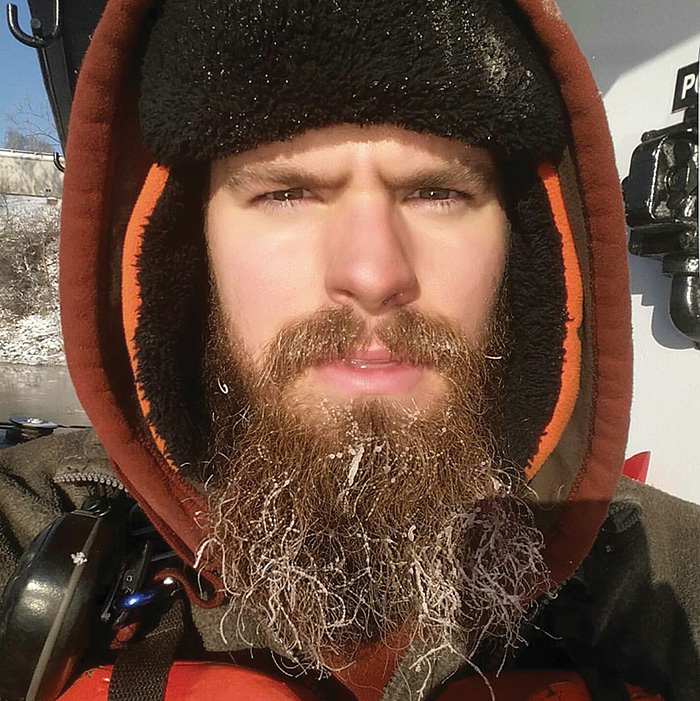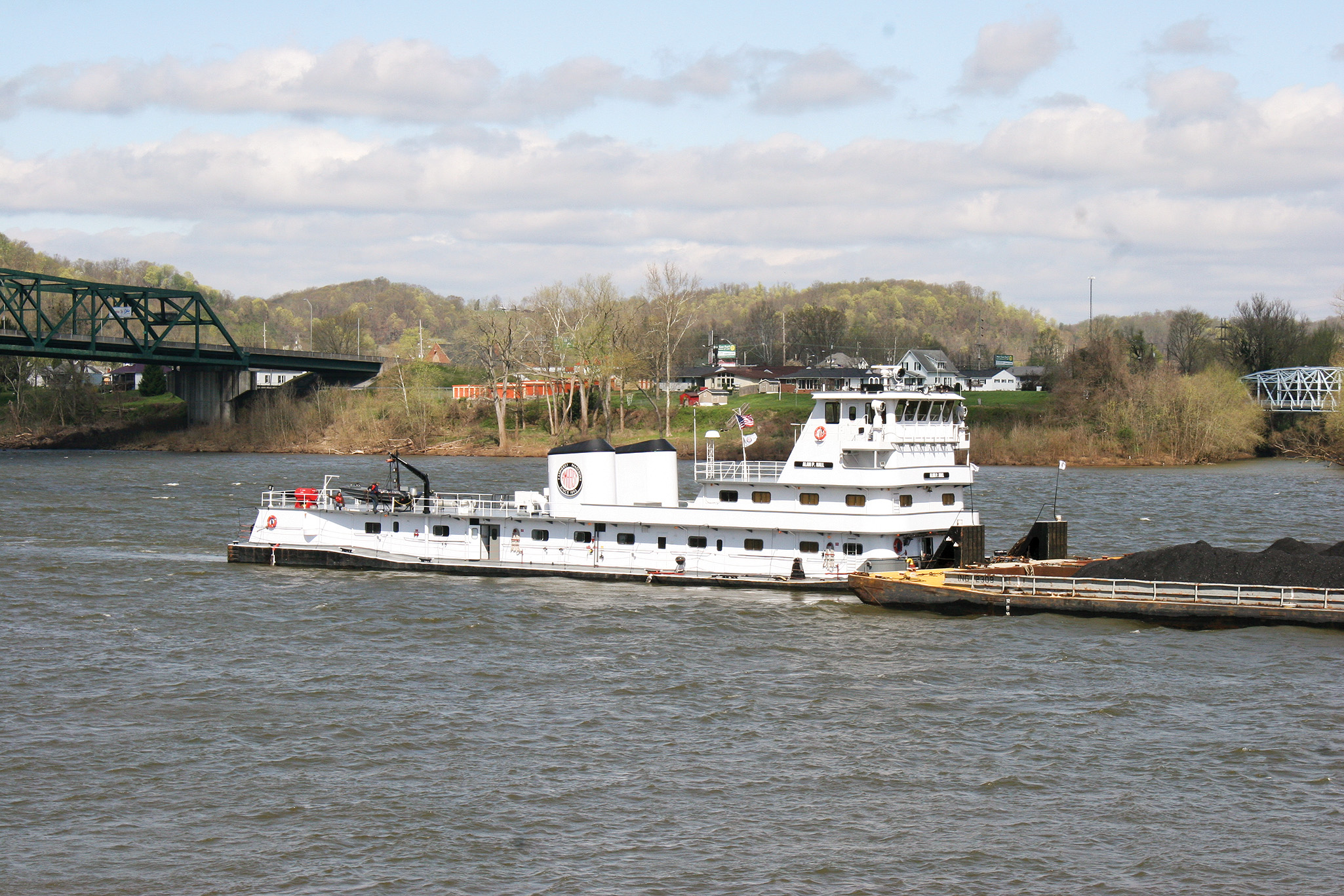Amherst Madison Deckhand Focus Of Media Series Video
The Waterways Journal
30 January 2017
By Heather Ervin

Ryan Gilleran (photo courtesy of Ryan Gilleran).
Last month, The Allegheny Front’s series “Headwaters” featured
an episode on Amherst Madison deckhand Ryan Gilleran, who
described life on a towboat transporting barges full of coal and
other materials up and down the Ohio River.
Produced by Ryan Loew, the video was created in partnership with
West Virginia Public Broadcasting with support from the Benedum
Foundation and the Foundation for Pennsylvania Watersheds.
Since the video was first published in early December 2016, it has
gone viral on various social media platforms. Several companies in
the industry have shared the video on Facebook and Twitter.
Set on board the mv. Alan P. Hall, a 4,200 hp. towboat owned and
operated by Amherst Madison, the video is one of many in the
“Headwaters” series, which explores the environmental and
economic importance of the Ohio River.
Alan Hall, the boat’s namesake and vice president-operations of
Amherst Madison, said he is very proud of the video and the
response it has elicited from the industry. “It was indeed
impressive,” said Hall. “We are very proud to be a part of it.”
Joining the film crew and Gilleran onboard the mv. Alan P. Hall
was Bill Barr, vice president-safety and compliance. Barr said the
coming together of the video is a story in its own right. “There’s
more to the story than what people see in the video,” he said.
The American Waterways Operators, for example, put the journalists
in charge of the video in touch with Amherst Madison, according to
Barr.
It’s the behind-the-scenes story that Barr alluded to during an
interview with The Waterways Journal that led us to contact the
video’s star, Gilleran. Who is he, how did the film come to be,
and why was he chosen as the face of the towboat industry for the
series? Check out the deckhand video below.
Waterways Journal: Before we dig into the video and how it came to
be, tell us about yourself and your experience in the marine
transportation industry.
Gilleran: I grew up in a city just outside of Detroit, Mich.,
and I went to college at Central Michigan University. Sometime
around graduation, I started having “what am I going to do with my
life” thoughts. The ones all young people have.
My grandfather was a private pilot, who grew up in West Virginia.
He would bring me down to Charleston to a small, private airport
and told the guys there what my plans were after graduation. One
of the guys at the airport told me about Amherst Madison. One of
the pilots, George Jones, is a relative of Charlie Jones, the CEO
of Amherst.
To make a long story short, I was told to apply for a deckhand
position. So I did. I was given a chance. My girlfriend and I
packed up our lives and moved to West Virginia a week later. I
didn’t know anything about the job or industry. I never thought I
would find myself floating on a river for weeks at a time. Now,
I’m coming up on three years on the river.

—photo courtesy of Amherst Madison
The video was filmed onboard Amherst Madison’s Alan P. Hall,
where Ryan Gilleran works as a deckhand (photo courtesy of Amherst
Madison).
WJ: Getting to the video, why and how were you selected to be the
main focus of the story? What was your reaction?
Gilleran: About a year ago or so, a couple of journalists
from Pittsburgh got in contact with people involved in the
industry and also with the people at Amherst. The journalists
explained that they had both seen towboats go through the city and
always wondered about the job. They wanted to put together a piece
to provide viewers a different perspective of the day in the life
of a river crew.
They interviewed everyone on the boat and had hopes of making a
larger piece that they could sell to a company like NPR. One of
the journalists had to move for work and wasn’t able to create the
piece she had hoped to make.
So, the footage sat collecting dust for nearly a year. That
changed recently when a cameraman (Loew) got hooked up with The
Allegheny Front. They wanted to do a series of videos about
blue-collar workers. Loew told them about the footage he had and
reached out to me while I was on the towboat and asked if I wanted
to be a part of the project.
At the time, I didn’t know much about what he was trying to
accomplish. I was just excited about the prospect of being able to
represent Amherst and the industry as a whole. I am always talking
with people at local pubs and gatherings about the industry and
sharing my perspective on such a vital and necessary industry for
so many aspects of industrial America that many people, including
myself, had not considered.
Loew had me do a phone interview with a local NPR station the day
I got off the towboat. That was nice, and anyone who knows me can
attest to my passion for audio and the spoken word. I rarely
listen to music anymore. Instead, I spend my free time during my
hitches listening to audiobooks. As a side note, I recently
challenged myself to listen to the biography of American
presidents and podcasts about everything from business, health and
comedy.
WJ: What was the filming process onboard like?
Gilleran: The filming took place over the course of about
five hours. We picked up the crew at Pittsburgh. They stayed on
the boat as we went through Locks and Dam 2 and did some tow work.
The crew got to see the whole boat, talk to Capt. R.L. Cadd as we
passed some tough bridges, and they got to go down to the
engineroom. They saw our rooms and watched us do some work with
the barges.
WJ: What did you enjoy most about doing the video?
Gilleran: The best part of being in the video was being
chosen to give my account of life on the river. I kept joking on
the boat that I was going to be the face of towboating.
I really was glad to do it, because I have done my best to
document my journey on the river through pictures and videos for
myself and friends. This video was really a great way to highlight
the industry and Amherst as a company that has been great to me
and my fellow coworkers for decades.
WJ: In your experience, how has the industry responded to the
video?
Gilleran: The industry response to the video has been great!
I’ve had several guys on the river give me the “ole-that-a-boy”
for doing it.
Funnily enough, my favorite part has been getting recognized by
lockmen in the Pittsburgh Engineer District. I always try and form
relationships with lockmen as I go through. I like learning about
their lives and it’s a welcome change of pace from the boat, as
there are only seven of us onboard at a time.
WJ: Is there anything you want our readers to know about the
video, you or the industry?
Gilleran: I want people to know that this is a great career
for people. It’s also great for those looking for a second chance
at a life and a career outside of some of the negative lifestyles
and choices they have been a part of in the past.
I’d really like to thank Amherst for helping me set roots in West
Virginia and allowing me to make a living and memories as a
deckhand up and down the Kanawha and Ohio rivers. I hope to
continue growing in the industry and seek out new opportunities as
a steward of the industry.
URL for article so you can see photos:
http://www.waterwaysjournal.net/Magazine/ThisWeeksTopNews/AmherstMadisonDeckhandFocusOfMediaSeriesVideo.aspx

